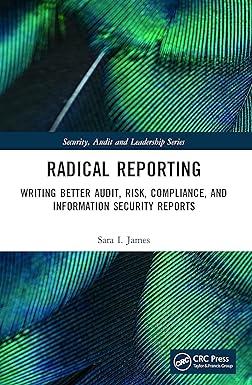Question
Title: Capstone: Should you buy plant and equipment in the last rounds? Assignment: Should you buy plant and equipment in the last rounds? In particular,
Title:
Capstone: Should you buy plant and equipment in the last rounds?
Assignment:
Should you buy plant and equipment in the last rounds? In particular, does it make sense to buy capacity in Round 7 if it can only be used in Round 8? For discussion purposes, assume that you have the following situation: Your product line is automated to 7.0. Your labor costs on first shift are $6.00 per unit, on second shift $9.00 per unit. Material costs are $12.00. Your product is priced at the top of the range, $31.50, so margins are excellent. You have 1000 units of capacity. Last round you ran 165% plant utilization, making 1650 units (and in this perfect world, selling 1649.) This round (round 7) you will max out your production making 2000 units. Next round you believe you could sell 2400 units. Your competitors could meet your unmet demand if they ratchet up their production on their inferior products, which they will certainly do if they see you are about to stock out. If you buy 200 units of capacity now, assume that you will produce and sell 400 units with this capacity in Round 8. Further assume a worst case the $6.8 million investment will be funded by a bond issue at 14.0%. Should you make the investment? Factors to consider:
For simplicity, consider a single unit of capacity. It would cost $34. You would produce two units with it, one on first shift and one on second. (Floor space is $6. Automation is $4 per unit. You are automated to 7.0, so the cost per unit of capacity is $6 + 7*$4 = $34.)
Depreciation is straight line over 15 years. You will pay depreciation in Round 8.
You will pay the interest (14% on $34) in both Round 7 and Round 8.
Note that the SG&A expenses (promo, sales, R&D, and admin costs) can be ignored since you will spend the this money whether you make the investment or not.
The opportunity cost of a missed sale on first shift is price minus cost of goods minus depreciation minus interest.
With this as background, what is the cash outflow on that single unit of capacity? What is the cash inflow on the first shift unit? On the second shift unit?
Step by Step Solution
There are 3 Steps involved in it
Step: 1

Get Instant Access to Expert-Tailored Solutions
See step-by-step solutions with expert insights and AI powered tools for academic success
Step: 2

Step: 3

Ace Your Homework with AI
Get the answers you need in no time with our AI-driven, step-by-step assistance
Get Started


